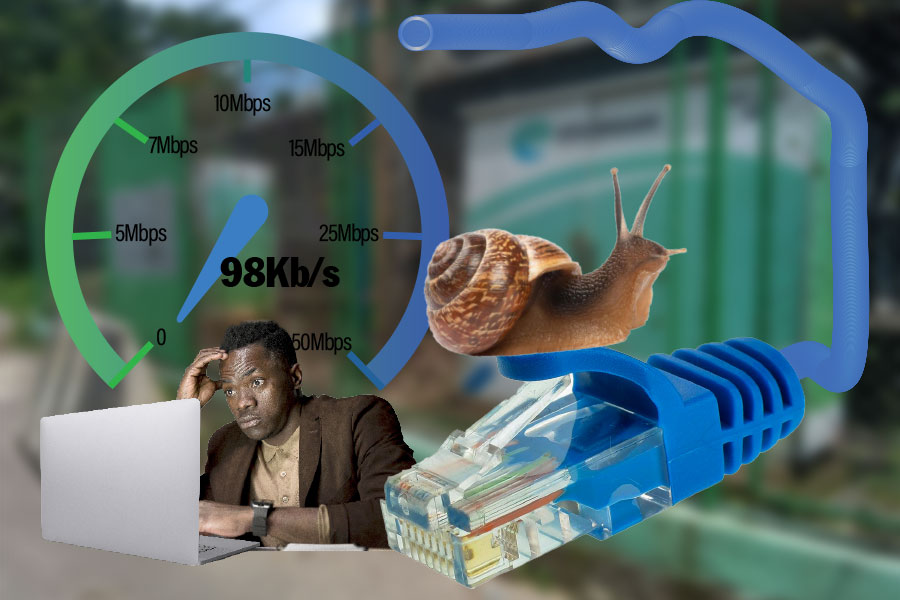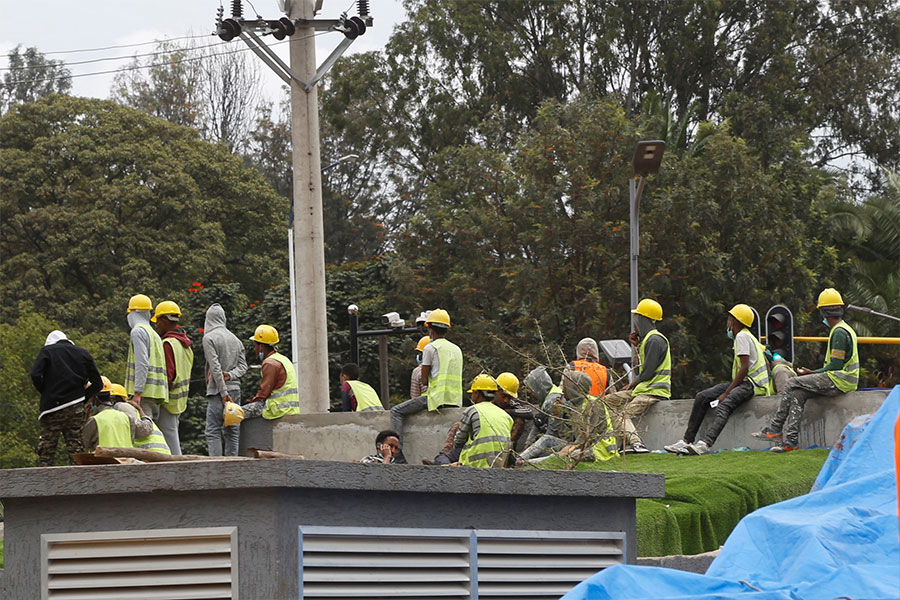
Commentaries | May 06,2023
Many students across the country have had to reacquaint themselves with what school means during the Novel Coronavirus (COVID-19) pandemic. For some students in the nation's capital, classes have continued uninterrupted in the comfort of their own homes on online platforms like Google Class and Zoom.
For others, it has meant taking worksheets from their schools and working on them at home, with the responsibility of teaching placed on parents now more than ever. For those living in remote areas such as Dawro Zone in the Southern Regional State, it has meant a complete standstill. Students have been disbanded until further notice.
The school compound of Woldehane Secondary & Preparatory School, in Gena Wereda, Dawro, lies testament to that. It has been eerily vacant for months now.
Students there have little to no access to radio and television, and they will remain at home until they are called back again, according to Amde Behailu, a teacher in Woldehane Secondary & Preparatory School.
"School has stopped since the official announcement was made in March," said Amde. "Most families here have no televisions or radios, and, this goes without saying, but the students don't have mobile phones either."
The school, with over 1,000 students, has continued to pay its teachers but has no means of continuing classes and has had its doors shut for over two months now.
The decision to close schools was handed down on March 16, 2020, as a way to contain the spread of COVID-19 in the country. Initially levied for two weeks, it has been extended indefinitely, revealing big disparities in the learning process for students throughout the country.
The government has also extended all final year examinations throughout all grades; a decision that will impact 26 million students in the country. This includes national qualification examinations for grade eight and grade 12 matriculation examinations.
Though there is an understanding that it will be difficult to reach students in remote areas where even electricity might not be accessible, the Ministry is working on facilitating and continuing the learning process through television and online platforms like Telegram, according to Haregua Mamo, communications director at the Ministry of Education.
Students there have little to no access to radio and television, and they will remain at home until they are called back again.
“We're providing the materials so that students can continue the learning process while at the same time ensuring that they'll be engaged in their homes since their physical interaction must be limited,” she said.
The examinations, postponed indefinitely, will be conducted once it is possible to work and regularly interact, according to the communications director.
"We don't expect the education process to be the same for all students so we will not be jumping straight to exams," she said, "but rather providing a short period of school to make sure students have been brought up to date before they sit for their exams."
Ensuring that students will be given revisions is equitable as students come from varying backgrounds, according to Tirussew Teferra (PhD), Ethiopian Education and Training Roadmap Project Leader.
“This is a decision that needs to vigorously involve teachers since they know their students best and what the progress was like while the schools were closed,” he said.
The decision to postpone exams and thereby pass students into the next grade or stage holds true for university undergraduate and Technical & Vocational Education & Training (TVET) students as well. Both public and private learning institutions cannot graduate or progress their students to the next grade as per the Ministry of Science & Higher Education.
The plan here is for a short-term crash course to be completed upon the students' return to schools followed by the examinations that will allow them to pass on to their next year or graduate, according to Andualem Admassie (PhD), director-general at the Higher Education Relevance & Quality Agency, the regulatory body.
"One justification for this decision is that students at this level aren't expected to have the resources to continue an online education successfully," said Andualem. "This is especially true in rural areas where even connectivity is very poor."
The crash course, when universities reopen, will be delivered free of charge. At the same time, the current methods of teaching students through different online platforms are provided at a minimum discounted rate of 25pc. This is a decision that has come from the Agency and is applicable to all public and private institutions.
Many students across the country have had to reacquaint themselves with what school means during the Novel Coronavirus (COVID-19) pandemic.
Postgraduate and doctoral students, however, are expected to proceed in line with the schedule countrywide, and virtual graduation preparations are underway for July 10 for Addis Abeba University students.
"We expect students at postgraduate levels and above to be able to work on their own," Andualem said. "It's a continuation of their undergraduate degrees. They are older, most of them are working, and they also have the resources to work online."
An online resource centre has been set up to make resources remotely available to students. The National Academic Digital Library was recently made functional to provide course modules and over 70,000 reference materials.
The Digital Library is fully functional with over 4,000 users a day, according to Zelalem Assefa, director-general of the Ethiopian Education & Research Network.
Another platform brought to life out of the necessity created by COVID-19 is the Electronic Learning Management System; an online platform designed for 50 universities in the country. Teachers can hold online classes for up to 250 participants and upload assignments, worksheets and other related materials for their students. The platform also has a corresponding application that students can use for data collection.
"We held over six rounds of online training for teachers on how to navigate the platform with over 500 participants at a time," said Zelalem. "We have weekly meetings with all the university academic vice-presidents as a way to share experiences and figure out the challenges."
Though students at graduate levels and above may be able to self-navigate and gain access to resources that are better, the problem for some students lies in the lack of progress they have been able to make so far.
A government-sponsored student in the master's programme in the College of Development Studies at Addis Abeba University said that the funds for their research work were released no more than 10 days ago. Additionally, data collection has been extremely difficult.
"People aren't willing to meet with you and talk because they are scared, especially if they know you're coming from Addis Abeba," she said. "We also can't conduct focus group discussions, because it's not advisable to meet in groups."
Due to these reasons, she and her classmates are now working on data collection a mere two months before the day of virtual graduation for Addis Abeba University.
For Tsion Molla, 23, whose thesis is on the assessment of the importance of sex education in the secondary school curriculum, it is next to impossible to graduate within this time frame. With schools closed, her progress came to a stop months ago.
“According to the schedule, we may need to pay for another full year because students like me won't be able to finish on time," she said. "I may even have to change my thesis focus fully."
Over 1,500 students are expected to graduate at Wollo University under its 95 graduate and post-graduate study programmes. The graduation is available for those that will somehow manage to complete their thesis on time, but the university is not oblivious to the challenges its students are facing.
This will be difficult for those that have to do data collection in certain periods, especially in the fields of natural science. Questionnaires are difficult to hand out in such times where people are trying to minimise any contacts with others, according to Abate Getahun (PhD), president of the University.
"We realise some students won't be able to graduate within this time,” he said.
The reopening of schools may be a question on most students' and parents' minds. The work required before reopening schools, however, is something that will preferably have a national task force assigned to assess what measures will have to be put in place before resuming school, according to Tirussew, the education expert.
“The task force should engage teachers, health and psychological experts," he said. "In the meantime, we need to make sure that there is a loophole within which students are being evaluated upon what they can do and achieve given the disparity in resource availability."
The country needs to take a close look at what the new normal will look like, in terms of teaching, learning and socialising, advised the expert.
PUBLISHED ON
May 31,2020 [ VOL
21 , NO
1049]

Commentaries | May 06,2023

Editorial | Jun 05,2021

Fortune News | Aug 17,2025

Commentaries | Jun 05,2021

Viewpoints | Jun 10,2023

Films Review | Apr 17,2020

Radar | Oct 09,2021

Fortune News | Jul 06,2025

View From Arada | Mar 07,2020

View From Arada | Aug 03,2024

Dec 22 , 2024 . By TIZITA SHEWAFERAW
Charged with transforming colossal state-owned enterprises into modern and competitiv...

Aug 18 , 2024 . By AKSAH ITALO
Although predictable Yonas Zerihun's job in the ride-hailing service is not immune to...

Jul 28 , 2024 . By TIZITA SHEWAFERAW
Unhabitual, perhaps too many, Samuel Gebreyohannes, 38, used to occasionally enjoy a couple of beers at breakfast. However, he recently swit...

Jul 13 , 2024 . By AKSAH ITALO
Investors who rely on tractors, trucks, and field vehicles for commuting, transporting commodities, and f...

Oct 4 , 2025
Eyob Tekalegn (PhD) had been in the Governor's chair for only weeks when, on Septembe...

Sep 27 , 2025
Four years into an experiment with “shock therapy” in education, the national moo...

Sep 20 , 2025
Getachew Reda's return to the national stage was always going to stir attention. Once...

Sep 13 , 2025
At its launch in Nairobi two years ago, the Africa Climate Summit was billed as the f...